小升初专题复习 一般将来时 课件(共67张PPT)
文档属性
| 名称 | 小升初专题复习 一般将来时 课件(共67张PPT) | 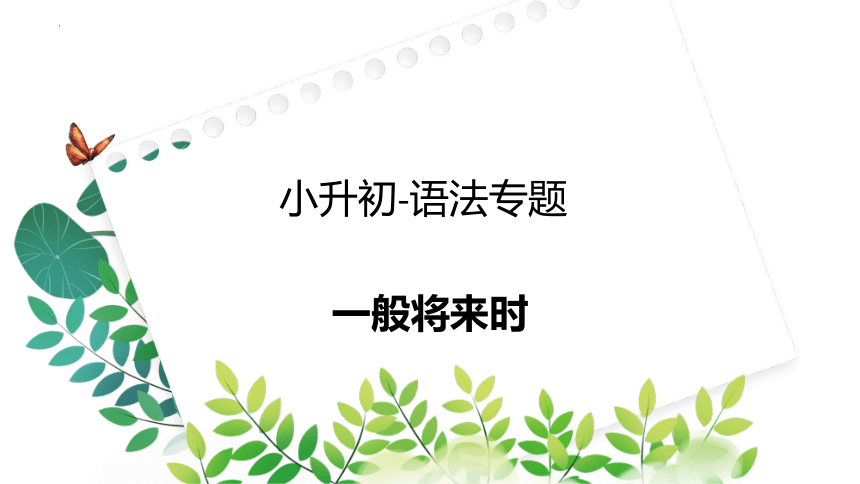 | |
| 格式 | pptx | ||
| 文件大小 | 8.6MB | ||
| 资源类型 | 教案 | ||
| 版本资源 | 通用版 | ||
| 科目 | 英语 | ||
| 更新时间 | 2023-05-06 21:37:17 | ||
图片预览

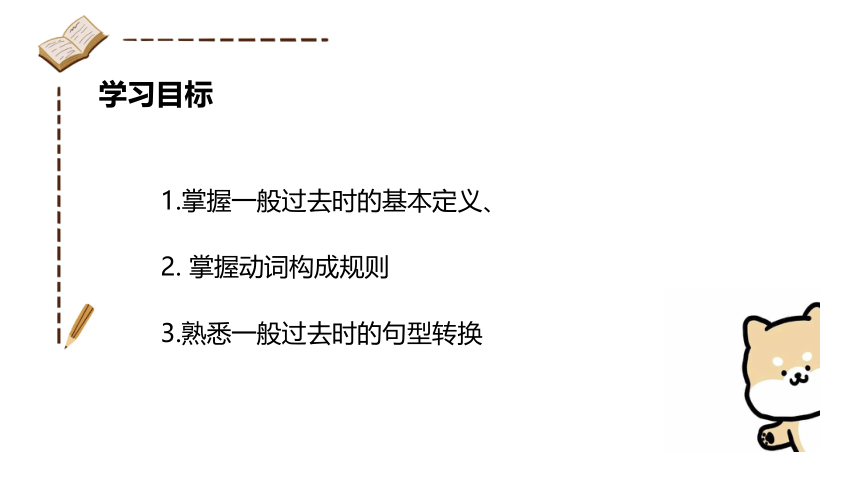
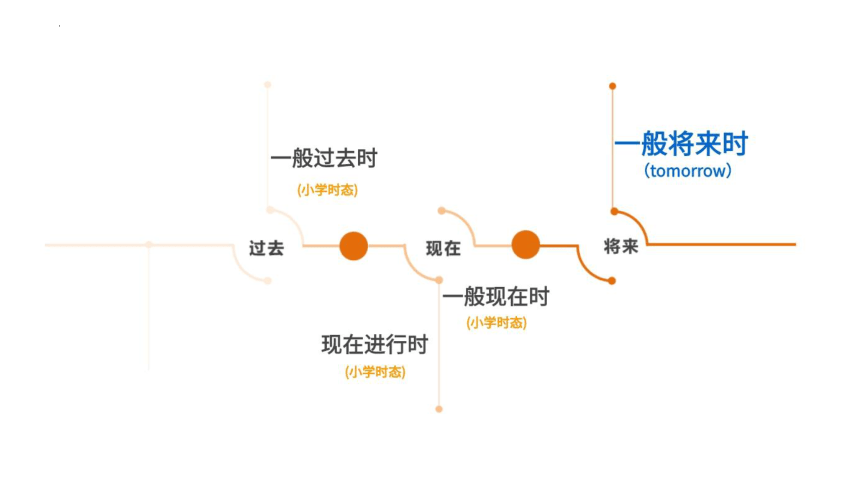
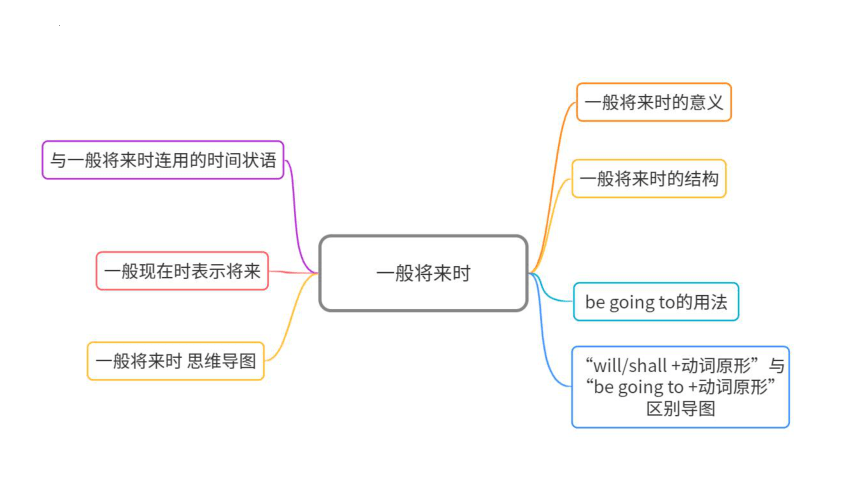
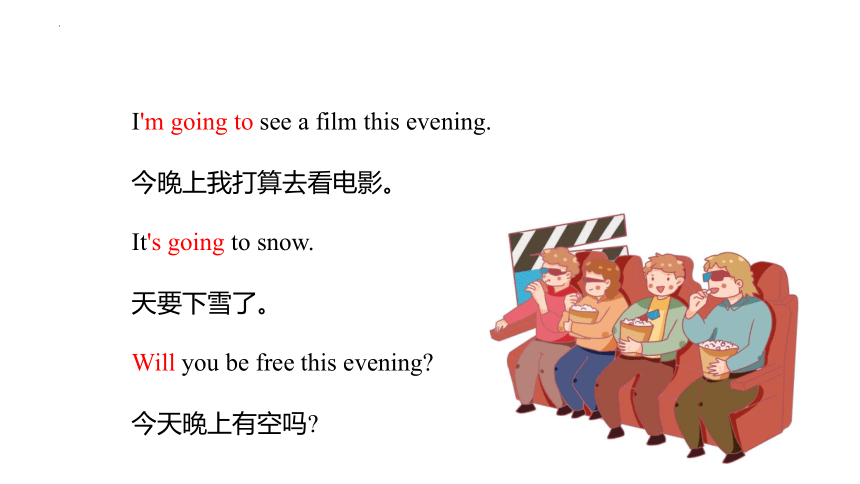
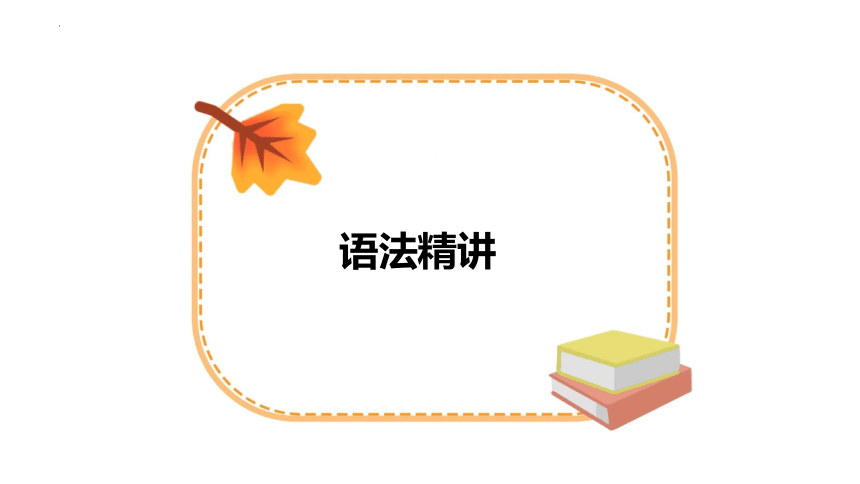
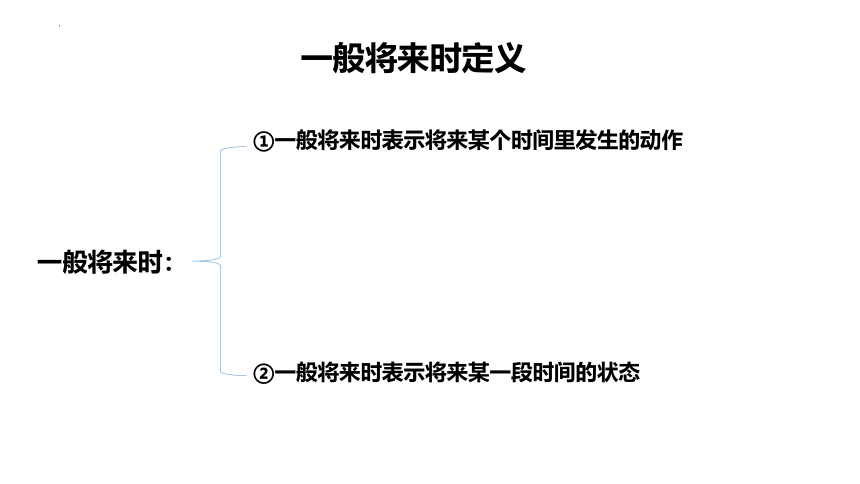
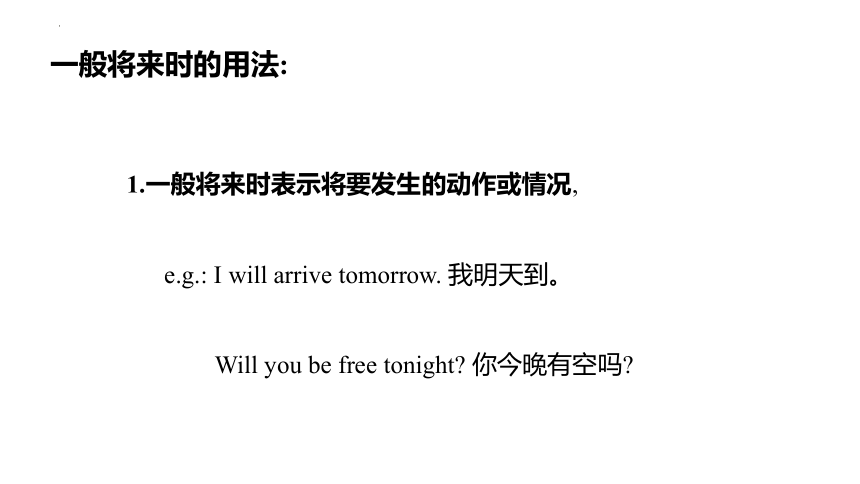
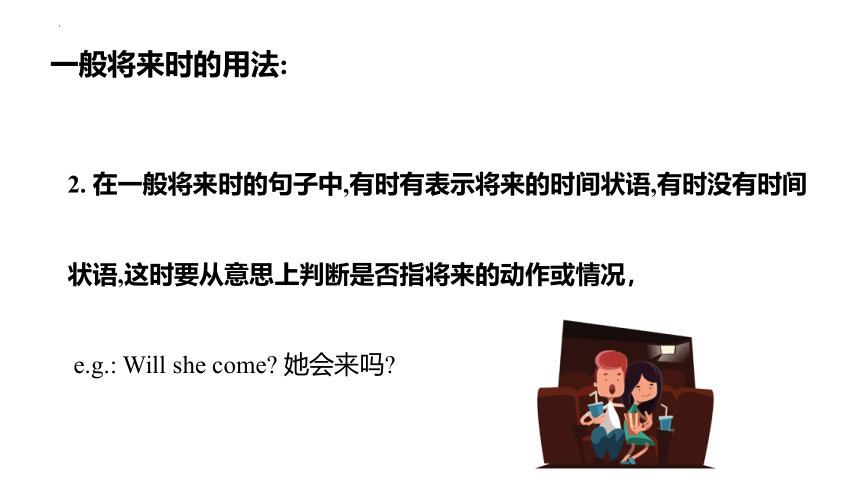
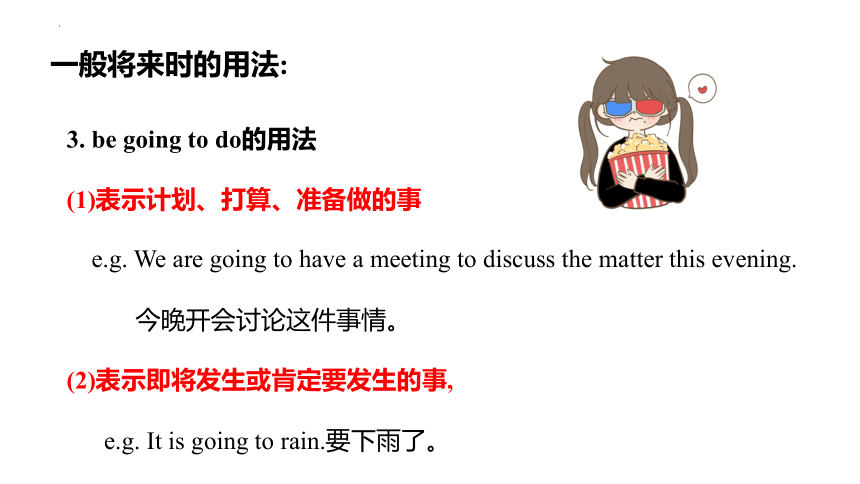
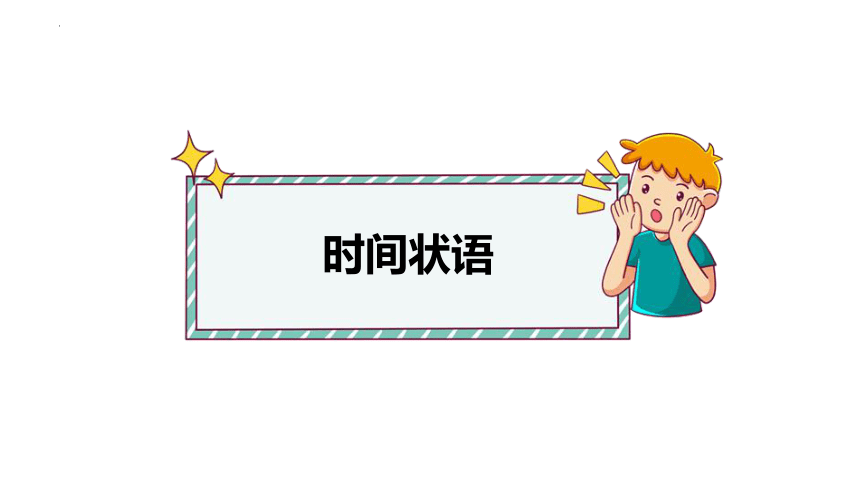
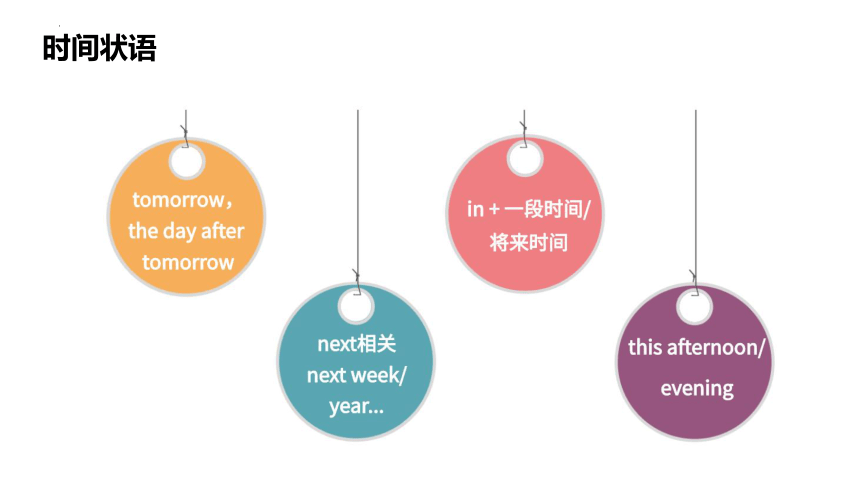
文档简介
(共67张PPT)
小升初-语法专题
一般将来时
1.掌握一般过去时的基本定义、
2. 掌握动词构成规则
3.熟悉一般过去时的句型转换
学习目标
I'm going to see a film this evening.
今晚上我打算去看电影。
It's going to snow.
天要下雪了。
Will you be free this evening
今天晚上有空吗
语法精讲
①一般将来时表示将来某个时间里发生的动作
②一般将来时表示将来某一段时间的状态
一般将来时定义
一般将来时:
一般将来时的用法:
1.一般将来时表示将要发生的动作或情况,
e.g.: I will arrive tomorrow. 我明天到。
Will you be free tonight 你今晚有空吗
一般将来时的用法:
2. 在一般将来时的句子中,有时有表示将来的时间状语,有时没有时间状语,这时要从意思上判断是否指将来的动作或情况,
e.g.: Will she come 她会来吗
一般将来时的用法:
3. be going to do的用法
(1)表示计划、打算、准备做的事
e.g. We are going to have a meeting to discuss the matter this evening.
今晚开会讨论这件事情。
(2)表示即将发生或肯定要发生的事,
e.g. It is going to rain.要下雨了。
时间状语
时间状语
时间状语
tomorrow 系列:
tomorrow morning
tomorrow afternoon
tomorrow evening
the day after tomorrow
at 7:00 tomorrow morning
next 系列:
next time next day
next week next month
next year next term
next Monday
at 7:00 next Sunday morning
时间状语
in +一段时间 系列:
in three hours
in three days
in a week
in two months
in 20 years
this + 时间 系列:
this evening
this afternoon
this Saturday afternoon
this Sunday
谓语形式
will do
be going to do
will not(won’t) do
be not going to do
肯定句 否定句
谓语形式
will do
be going to do
Will +主语 + do...
Be +主语 going to do
肯定句 一般疑问句
谓语形式
will do
be going to do
Wh-疑问词+ will +主语 + do?
Wh-疑问词+ be +主语 going to do?
肯定句 特殊疑问句
will 句型:
陈述句:主语+will+动词原形+其他.
e.g.: I will see a film tomorrow.
否定句:主语+will+not+动词原形+其他.
e.g.: We will not watch TV because we have a lot of homework.
一般疑问句:Will+主语+动词原形+其他
e.g.:Will you go to school by car
特殊疑问句:特殊疑问词+will+(主语)+动词原形+其他
e.g.: Where will you go Who will come to our party
will 句型:
be going to 句型:
陈述句:主语+be going to+动词原形+其他.
e.g.: I am going to read English in the evening.
否定句:主语+be not going to+动词原形+其他.
e.g.: We are not going to go swimming tomorrow.
be going to 句型:
一般疑问句: Be+主语+going to+动词原形+其他
e.g.: Are you going to have a picnic this afternoon
特殊疑问句:特殊疑问词+be+(主语)+going to+动词原形+其他
e.g.: What are you going to do tomorrow
一般将来时的句型转换
一般将来时的句型转换
一般将来时结构区别
be going to + do 表示计划、打算做某事或者
有迹象表明某事要发生。
will +do 表示的将来时间则较远一些;
客观上将来势必发生的事情。
一般将来时的结构
一般过去时的句型区别
will和be going to都表示将要发生的事,将要做某事。一般情况下, will和be going to可以相互转换。
e.g: I will study hard next term.
am going to
Are they going to write carefully next year
Will
一般过去时的句型区别
will+动词原形
没有经过计划,临时出现的意图,常伴有说话者的主观意识或者将来必然发生的事。
be going to+动词原形
既可以指主观打算(事先思考过)也可指客观迹象表明将要发生的事。
一般过去时的句型区别
但will和be going to有区别:
1. be going to表示将要发生的事情will表示的时间较远一些。
e.g: He is going to write a letter tonight. He will write a book one day.
一般过去时的句型区别
但will和be going to有区别:
2. be going to表示主观判断将来肯定发生的事情will表示客观上势必发生的事情。
e.g: He is going to die.He will be twenty years old.
一般过去时的句型区别
但will和be going to有区别:
3. be going to有“计划、准备”的意思。will没有这个意思。e.g: She is going to lend us her book.He will be here in half an hour.
一般将来时的用法
一般将来时,很简单;两种形式要记清;
will/be going to后接动词原形;
要变一般疑问句, will/be放在主语前;
否定句式也简单, will/be后边not添;
时间状语要牢记;下个明天还很远(next, tomorrow, in, soon)
来来去去(come, go, leave)特殊性.将来要用be doing;
特殊句型(there be)要熟记。
will 常见的缩写形式
一般将来时
vs
There be
表达“某个地方或某个时间存在什么事物或人”的时候,常用"There be+名词+地点(时间)”这一句型。
如:那儿有一棵树。There is a tree.
there be是“有”的意思。我们还学过have这个词,也是“有”的意思。一定要注意的是: there be和have不可混用。即:没有there have这种结构。
There be 的一般将来时结构
一般将来时结构
一般形式:There be There is a meeting.
将来形式:There will be There will be a meeting.
There is/are going to be There is going to be a meeting.
There be 的一般将来时结构
例题精讲
1. Tomorrow ________ go back to school.
A. you
B. you're
C. you'll
答案: C、
分析:句子意思是:明天回到学校.根据时间tomorrow"明天"可知句子时态是一般将来时,A选项和B选项都是一般现在时,只有C选项是将来时,故答案为:C.
2. I will ______ rice ______ my mother this evening.
A. cook; for
B. cooks; to
C. cooking; for
答案:A、
分析:will后面接动词原形。
3. 句型转换 we,have ,rain, will, a, heavy, wind, and, strong,tomorrow(连词成句)
_____________________________________________________________________
答案: We will have a heavy rain and strong wind tomorrow.
分析:明天我们将会有场大雨和强风.考查连词成句.句号表示陈述句,主谓宾结构."will"表示"将要",时态用一般将来时,后面跟动词原形have."aheavy rain"表示"大"; "and(和)"并列连词,"strong wind"表示"强风"; tomorrow时间状语,位于句末.故填:We will have a heavy rain and strong wind tomorrow.
4. ---______ you ______ football tomorrow afternoon
--- Yes,we are.
A. Are, playing
B. Do, play
C. Are, going to play
答案: C、分析:考查一般将来时.play football 踢足球,tomorrow afternoon明天下午,根据问句中的tomorrow afternoon明天下午,可知应使用一般将来时态表未来,一般将来时的形式为be going to+动词原形.故答案:C.。
5. My mother _______ me a computer as a birthday present next year.
A. gives
B. will give
C. gave
D. give
答案: B、分析:句意:明年我的母亲要为我买一台电脑作为生日礼物。结合语境及时间状语可知本句描述的是将来的动作,故用一般将来时态。选答案B。
6.There ____ a basketball match between Grade 1 and Grade 2 on Friday afternoon.
A. have B. is going to be
C. has D.is going to have
答案: B、
分析:句意:周五下午将会有一场一年级和二年级之同的篮球比赛。There is going to be将会举行。故选B。
7. I ______ a foreign language next year.
A. will be learn B. am going to learn
C. learn D. learning
答案: B、
分析:句意:我明年打算学习一门外语。will be learn形式错误,应将be去掉; am going to learn将要学习,是一般将来时态; learn学习,动词原形; learning现在分词。根据句意next year可知,这里说的是将来的事情,故应用一般将来时态,故选B。
8. The wind begins. It ______ a little cool.
A. will be
B. can be
C. should be
D. would be
答案: A、分析:句意:起风了,会有点凉爽。will be将会是; can be可能是; should be应该是; would be过去将来时。根据句意可知,刮风会使天气变得凉爽,这里应用一般将来时态,故应选A。
9. ---I ______ take an English exam next Tuesday.
--- ______ you have taken everything you need.
A. am going, Make sure B. will, Make out
C. am going to, Make up D.will, Make sure
答案:D、分析:句意:-下周二我将进行一次英语测试。-确信你带上了你需要的一切。根据时间next Tuesday可知用将来时, be going to 或 will do; make sure,确信,弄清楚, make up 组成,构成。make out, 辨认。结合句意,故选D。
10. The President_______China in the near future.
A. visit
B. visited
C. have visited
D. will visit
答案:D、分析:句意:总统在不久的将来出访中国,根据in the near future在不久的将来,可知为一般将来时,故选D.考点:考查一般将来时
11. 句型转换
They clean the classroom every day. ( tomorrow 代 every day)
They _____ ______ the classroom tomorrow.
答案: will; clean
分析:句意:他们每天打扫教室。这是一般现在时的句子.用tomorrow代替every day后该用一般将来时态。
12. 句型转换
His father will be back next week. (对划线部分提问)
______ _______ his father be back
答案: When will
分析:句意:他爸爸将在下周回来。该句是--般将来时,对时间提问要用特殊疑问词when,故正确答案为When will.
13. 句型转换
He will leave Chongqing in two days. (对划线部分提问)
______ _______ will he leave Chongqing
答案: How soon
分析:两天后他要离开重庆。划线部分表示时间,两天后,对其提问可用how soon引起问句。所以可在改写后句子的空白处填写How soon。
14. He' Il go to see the doctor tomorrow.(改为否定句)
He ____ ______ _____ _____ the doctor tomorrow.
答案: won't go to see
分析:明天他将去看医生。will+动词原形,否定形式是won'tdo,故填won' t go to see
15. They are going to have a sports meeting next week.(对画线部分提问)
____ ____ they going to have a sports meeting
答案:When; are 分析:句意:下周他们打算举行运动会。根据划线部分是时间状语,所以用when提问。be going to+动词原形构成的一般将来时态的句子变特殊疑问句时,用特殊疑问词+一般疑问句的形式,故填(1). When (2).are。
16. -Will Bob study in the USA next year (补全定答语)
-Yes, _______ _______.
答案: he will
分析:句意:-一鲍勃明年将在美国学习吗 是的,他将要在美国学习。题干是一般将来时态,will是助动词,肯定回答中必须出现will, Bob在答语中要用he来替代,故答案为(1). he (2). will.
巩固练习
填空。
1. 我打算明天和朋友去野炊。
I _____ _______ _________ have a picnic with my friends.
I ________ have a picnic with my friends.
2. 下个星期一你打算去干嘛 我想去打篮球。
What ________ ________ _________ _________ _________ next Monday I _______ ______ _____ play basketball.
What _________ you do next Monday I ________ play basketball.
填空。
3. 你妈妈这个周末去购物吗?是,她要去买一些水果。
_____ your mother _______ ________ go shopping this ___________
Yes, she _________. She ______ ________ __________ buy some fruit.
4. 你们打算什么时候见面。
What time _______ you _________ __________ meet
5. Nancy is going to go camping.(改否定)
Nancy ________ going to go camping.
6. I'll go and join them.(改否定)
I _______ go ______ join them.
7. I'm going to get up at 6:30 tomorrow.(改一般疑问句)
________ _______ ________ to get up at 6:30 tomorrow
8. We will meet at the bus stop at 10:30.(改一般疑问句)
_______ ________ meet at the bus stop at 10:30
9. She is going to listen to music after school.(对划线部分提问)
________ _______ she ________ ________ _________ after school
10. My father and mother are going to see a play the day after tomorrow.(同上)
_________ _________ going to see a play the day after tomorrow
用所给词的适当形式填空。
11. Today is a sunny day. We ___________________ (have) a picnic this afternoon.
12. My brother _______________ (go) to Shanghai next week.
13. Tom often ______________(go) to school on foot. But today is rain. He
______________ (go) to school by bike.
14. What do you usually do at weekends I usually __________ (watch) TV and
____________(catch) insects
15. It's Friday today. What _____she _________ (do) this weekend She
______________ (watch ) TV and _____________ (catch) insects.
用所给词的适当形式填空。
16. What ___________ (d0) you do last Sunday I ____________ (pick) apples on a
farm. What ______________ (do) next Sunday I ______________ (milk) cows.
17. Mary ____________ (visit) her grandparents tomorrow.
18. Liu Tao ____________ (fly) kites in the playground yesterday.
19. David ______________ (give) a puppet show next Monday.
20. I ________________ (plan) for my study now.
动词填空。
1. I ______(leave)in a minute. I ______(finish)all my work before I ______ (leave).
2. —What ______ you ______(do)after you ______(leave)here
—I ______________(return)home and ______(get)a job.
3. I ______(be)tired. I ______(go)to bed early tonight.
4. —_____ you _____(be)here this Saturday
—No. I ______(visit)my teacher.
5. —______ I ______(get)you a copy of today’s newspaper
—Thank you.
按要求改写句子
1. He did some washing yesterday.(改为一般疑问句)
______he______ any washing yesterday
2. Bruce bought a dictionary yesterday. (改为否定句)
Bruce ________ ________ a dictionary yesterday.
3. Uncle Wang likes making things. (改写为否定句)
Uncle Wang _______ _______ making things.
4. Mr. Smith does morning exercises every day. (改为一般疑问句)
________ Mr. Smith ______ morning exercises every day
选择题
( ) 1. There __________ a meeting tomorrow afternoon.
A. will be going to B. will going to be C. is going to be D. will go to be
( ) 2. Charlie ________ here next month.
A. isn’t working B. doesn’t working C. isn’t going to working D. won’t work
( ) 3. He ________ very busy this week, but he ________ free next week.
A. will be; is B. is; is C. will be; will be D. is; will be
( ) 4. There ________ a dolphin show in the zoo tomorrow evening.
A. was B. is going to have C. will have D. is going to be
( ) 5. –_____ you ______ free tomorrow
– No. I _____ free the day after tomorrow.
A. Are; going to; will B. Are; going to be; will
C. Are; going to; will be D. Are; going to be; will be
( ) 6. Mother ________ me a nice present on my next birthday.
A. will gives B. will give C. gives D. give
( ) 7. – Shall I buy a cup of tea for you
–________. (不,不要。)
A. No, you won’t. B. No, you aren’t. C. No, thanks. D. No, please.
( ) 8. – Where is the morning paper
– I ________ it for you at once.
A. get B. am getting C. to get D. will get
( ) 9. ________ a concert next Saturday
A. There will be B. Will there be C. There can be D. There are
( ) 10. If they come, we ________ a meeting.
A. have B. will have C. had D. would have
( ) 11. He ________ her a beautiful hat on her next birthday.
A. gives B. gave C. will giving D. is going to give
( ) 12. He ________ to us as soon as he gets there.
A. writes B. has written C. will write D. wrote
( ) 13. He ________ in three days.
A. coming back B. came back C. will come back D. is going to coming back
小升初-语法专题
一般将来时
1.掌握一般过去时的基本定义、
2. 掌握动词构成规则
3.熟悉一般过去时的句型转换
学习目标
I'm going to see a film this evening.
今晚上我打算去看电影。
It's going to snow.
天要下雪了。
Will you be free this evening
今天晚上有空吗
语法精讲
①一般将来时表示将来某个时间里发生的动作
②一般将来时表示将来某一段时间的状态
一般将来时定义
一般将来时:
一般将来时的用法:
1.一般将来时表示将要发生的动作或情况,
e.g.: I will arrive tomorrow. 我明天到。
Will you be free tonight 你今晚有空吗
一般将来时的用法:
2. 在一般将来时的句子中,有时有表示将来的时间状语,有时没有时间状语,这时要从意思上判断是否指将来的动作或情况,
e.g.: Will she come 她会来吗
一般将来时的用法:
3. be going to do的用法
(1)表示计划、打算、准备做的事
e.g. We are going to have a meeting to discuss the matter this evening.
今晚开会讨论这件事情。
(2)表示即将发生或肯定要发生的事,
e.g. It is going to rain.要下雨了。
时间状语
时间状语
时间状语
tomorrow 系列:
tomorrow morning
tomorrow afternoon
tomorrow evening
the day after tomorrow
at 7:00 tomorrow morning
next 系列:
next time next day
next week next month
next year next term
next Monday
at 7:00 next Sunday morning
时间状语
in +一段时间 系列:
in three hours
in three days
in a week
in two months
in 20 years
this + 时间 系列:
this evening
this afternoon
this Saturday afternoon
this Sunday
谓语形式
will do
be going to do
will not(won’t) do
be not going to do
肯定句 否定句
谓语形式
will do
be going to do
Will +主语 + do...
Be +主语 going to do
肯定句 一般疑问句
谓语形式
will do
be going to do
Wh-疑问词+ will +主语 + do?
Wh-疑问词+ be +主语 going to do?
肯定句 特殊疑问句
will 句型:
陈述句:主语+will+动词原形+其他.
e.g.: I will see a film tomorrow.
否定句:主语+will+not+动词原形+其他.
e.g.: We will not watch TV because we have a lot of homework.
一般疑问句:Will+主语+动词原形+其他
e.g.:Will you go to school by car
特殊疑问句:特殊疑问词+will+(主语)+动词原形+其他
e.g.: Where will you go Who will come to our party
will 句型:
be going to 句型:
陈述句:主语+be going to+动词原形+其他.
e.g.: I am going to read English in the evening.
否定句:主语+be not going to+动词原形+其他.
e.g.: We are not going to go swimming tomorrow.
be going to 句型:
一般疑问句: Be+主语+going to+动词原形+其他
e.g.: Are you going to have a picnic this afternoon
特殊疑问句:特殊疑问词+be+(主语)+going to+动词原形+其他
e.g.: What are you going to do tomorrow
一般将来时的句型转换
一般将来时的句型转换
一般将来时结构区别
be going to + do 表示计划、打算做某事或者
有迹象表明某事要发生。
will +do 表示的将来时间则较远一些;
客观上将来势必发生的事情。
一般将来时的结构
一般过去时的句型区别
will和be going to都表示将要发生的事,将要做某事。一般情况下, will和be going to可以相互转换。
e.g: I will study hard next term.
am going to
Are they going to write carefully next year
Will
一般过去时的句型区别
will+动词原形
没有经过计划,临时出现的意图,常伴有说话者的主观意识或者将来必然发生的事。
be going to+动词原形
既可以指主观打算(事先思考过)也可指客观迹象表明将要发生的事。
一般过去时的句型区别
但will和be going to有区别:
1. be going to表示将要发生的事情will表示的时间较远一些。
e.g: He is going to write a letter tonight. He will write a book one day.
一般过去时的句型区别
但will和be going to有区别:
2. be going to表示主观判断将来肯定发生的事情will表示客观上势必发生的事情。
e.g: He is going to die.He will be twenty years old.
一般过去时的句型区别
但will和be going to有区别:
3. be going to有“计划、准备”的意思。will没有这个意思。e.g: She is going to lend us her book.He will be here in half an hour.
一般将来时的用法
一般将来时,很简单;两种形式要记清;
will/be going to后接动词原形;
要变一般疑问句, will/be放在主语前;
否定句式也简单, will/be后边not添;
时间状语要牢记;下个明天还很远(next, tomorrow, in, soon)
来来去去(come, go, leave)特殊性.将来要用be doing;
特殊句型(there be)要熟记。
will 常见的缩写形式
一般将来时
vs
There be
表达“某个地方或某个时间存在什么事物或人”的时候,常用"There be+名词+地点(时间)”这一句型。
如:那儿有一棵树。There is a tree.
there be是“有”的意思。我们还学过have这个词,也是“有”的意思。一定要注意的是: there be和have不可混用。即:没有there have这种结构。
There be 的一般将来时结构
一般将来时结构
一般形式:There be There is a meeting.
将来形式:There will be There will be a meeting.
There is/are going to be There is going to be a meeting.
There be 的一般将来时结构
例题精讲
1. Tomorrow ________ go back to school.
A. you
B. you're
C. you'll
答案: C、
分析:句子意思是:明天回到学校.根据时间tomorrow"明天"可知句子时态是一般将来时,A选项和B选项都是一般现在时,只有C选项是将来时,故答案为:C.
2. I will ______ rice ______ my mother this evening.
A. cook; for
B. cooks; to
C. cooking; for
答案:A、
分析:will后面接动词原形。
3. 句型转换 we,have ,rain, will, a, heavy, wind, and, strong,tomorrow(连词成句)
_____________________________________________________________________
答案: We will have a heavy rain and strong wind tomorrow.
分析:明天我们将会有场大雨和强风.考查连词成句.句号表示陈述句,主谓宾结构."will"表示"将要",时态用一般将来时,后面跟动词原形have."aheavy rain"表示"大"; "and(和)"并列连词,"strong wind"表示"强风"; tomorrow时间状语,位于句末.故填:We will have a heavy rain and strong wind tomorrow.
4. ---______ you ______ football tomorrow afternoon
--- Yes,we are.
A. Are, playing
B. Do, play
C. Are, going to play
答案: C、分析:考查一般将来时.play football 踢足球,tomorrow afternoon明天下午,根据问句中的tomorrow afternoon明天下午,可知应使用一般将来时态表未来,一般将来时的形式为be going to+动词原形.故答案:C.。
5. My mother _______ me a computer as a birthday present next year.
A. gives
B. will give
C. gave
D. give
答案: B、分析:句意:明年我的母亲要为我买一台电脑作为生日礼物。结合语境及时间状语可知本句描述的是将来的动作,故用一般将来时态。选答案B。
6.There ____ a basketball match between Grade 1 and Grade 2 on Friday afternoon.
A. have B. is going to be
C. has D.is going to have
答案: B、
分析:句意:周五下午将会有一场一年级和二年级之同的篮球比赛。There is going to be将会举行。故选B。
7. I ______ a foreign language next year.
A. will be learn B. am going to learn
C. learn D. learning
答案: B、
分析:句意:我明年打算学习一门外语。will be learn形式错误,应将be去掉; am going to learn将要学习,是一般将来时态; learn学习,动词原形; learning现在分词。根据句意next year可知,这里说的是将来的事情,故应用一般将来时态,故选B。
8. The wind begins. It ______ a little cool.
A. will be
B. can be
C. should be
D. would be
答案: A、分析:句意:起风了,会有点凉爽。will be将会是; can be可能是; should be应该是; would be过去将来时。根据句意可知,刮风会使天气变得凉爽,这里应用一般将来时态,故应选A。
9. ---I ______ take an English exam next Tuesday.
--- ______ you have taken everything you need.
A. am going, Make sure B. will, Make out
C. am going to, Make up D.will, Make sure
答案:D、分析:句意:-下周二我将进行一次英语测试。-确信你带上了你需要的一切。根据时间next Tuesday可知用将来时, be going to 或 will do; make sure,确信,弄清楚, make up 组成,构成。make out, 辨认。结合句意,故选D。
10. The President_______China in the near future.
A. visit
B. visited
C. have visited
D. will visit
答案:D、分析:句意:总统在不久的将来出访中国,根据in the near future在不久的将来,可知为一般将来时,故选D.考点:考查一般将来时
11. 句型转换
They clean the classroom every day. ( tomorrow 代 every day)
They _____ ______ the classroom tomorrow.
答案: will; clean
分析:句意:他们每天打扫教室。这是一般现在时的句子.用tomorrow代替every day后该用一般将来时态。
12. 句型转换
His father will be back next week. (对划线部分提问)
______ _______ his father be back
答案: When will
分析:句意:他爸爸将在下周回来。该句是--般将来时,对时间提问要用特殊疑问词when,故正确答案为When will.
13. 句型转换
He will leave Chongqing in two days. (对划线部分提问)
______ _______ will he leave Chongqing
答案: How soon
分析:两天后他要离开重庆。划线部分表示时间,两天后,对其提问可用how soon引起问句。所以可在改写后句子的空白处填写How soon。
14. He' Il go to see the doctor tomorrow.(改为否定句)
He ____ ______ _____ _____ the doctor tomorrow.
答案: won't go to see
分析:明天他将去看医生。will+动词原形,否定形式是won'tdo,故填won' t go to see
15. They are going to have a sports meeting next week.(对画线部分提问)
____ ____ they going to have a sports meeting
答案:When; are 分析:句意:下周他们打算举行运动会。根据划线部分是时间状语,所以用when提问。be going to+动词原形构成的一般将来时态的句子变特殊疑问句时,用特殊疑问词+一般疑问句的形式,故填(1). When (2).are。
16. -Will Bob study in the USA next year (补全定答语)
-Yes, _______ _______.
答案: he will
分析:句意:-一鲍勃明年将在美国学习吗 是的,他将要在美国学习。题干是一般将来时态,will是助动词,肯定回答中必须出现will, Bob在答语中要用he来替代,故答案为(1). he (2). will.
巩固练习
填空。
1. 我打算明天和朋友去野炊。
I _____ _______ _________ have a picnic with my friends.
I ________ have a picnic with my friends.
2. 下个星期一你打算去干嘛 我想去打篮球。
What ________ ________ _________ _________ _________ next Monday I _______ ______ _____ play basketball.
What _________ you do next Monday I ________ play basketball.
填空。
3. 你妈妈这个周末去购物吗?是,她要去买一些水果。
_____ your mother _______ ________ go shopping this ___________
Yes, she _________. She ______ ________ __________ buy some fruit.
4. 你们打算什么时候见面。
What time _______ you _________ __________ meet
5. Nancy is going to go camping.(改否定)
Nancy ________ going to go camping.
6. I'll go and join them.(改否定)
I _______ go ______ join them.
7. I'm going to get up at 6:30 tomorrow.(改一般疑问句)
________ _______ ________ to get up at 6:30 tomorrow
8. We will meet at the bus stop at 10:30.(改一般疑问句)
_______ ________ meet at the bus stop at 10:30
9. She is going to listen to music after school.(对划线部分提问)
________ _______ she ________ ________ _________ after school
10. My father and mother are going to see a play the day after tomorrow.(同上)
_________ _________ going to see a play the day after tomorrow
用所给词的适当形式填空。
11. Today is a sunny day. We ___________________ (have) a picnic this afternoon.
12. My brother _______________ (go) to Shanghai next week.
13. Tom often ______________(go) to school on foot. But today is rain. He
______________ (go) to school by bike.
14. What do you usually do at weekends I usually __________ (watch) TV and
____________(catch) insects
15. It's Friday today. What _____she _________ (do) this weekend She
______________ (watch ) TV and _____________ (catch) insects.
用所给词的适当形式填空。
16. What ___________ (d0) you do last Sunday I ____________ (pick) apples on a
farm. What ______________ (do) next Sunday I ______________ (milk) cows.
17. Mary ____________ (visit) her grandparents tomorrow.
18. Liu Tao ____________ (fly) kites in the playground yesterday.
19. David ______________ (give) a puppet show next Monday.
20. I ________________ (plan) for my study now.
动词填空。
1. I ______(leave)in a minute. I ______(finish)all my work before I ______ (leave).
2. —What ______ you ______(do)after you ______(leave)here
—I ______________(return)home and ______(get)a job.
3. I ______(be)tired. I ______(go)to bed early tonight.
4. —_____ you _____(be)here this Saturday
—No. I ______(visit)my teacher.
5. —______ I ______(get)you a copy of today’s newspaper
—Thank you.
按要求改写句子
1. He did some washing yesterday.(改为一般疑问句)
______he______ any washing yesterday
2. Bruce bought a dictionary yesterday. (改为否定句)
Bruce ________ ________ a dictionary yesterday.
3. Uncle Wang likes making things. (改写为否定句)
Uncle Wang _______ _______ making things.
4. Mr. Smith does morning exercises every day. (改为一般疑问句)
________ Mr. Smith ______ morning exercises every day
选择题
( ) 1. There __________ a meeting tomorrow afternoon.
A. will be going to B. will going to be C. is going to be D. will go to be
( ) 2. Charlie ________ here next month.
A. isn’t working B. doesn’t working C. isn’t going to working D. won’t work
( ) 3. He ________ very busy this week, but he ________ free next week.
A. will be; is B. is; is C. will be; will be D. is; will be
( ) 4. There ________ a dolphin show in the zoo tomorrow evening.
A. was B. is going to have C. will have D. is going to be
( ) 5. –_____ you ______ free tomorrow
– No. I _____ free the day after tomorrow.
A. Are; going to; will B. Are; going to be; will
C. Are; going to; will be D. Are; going to be; will be
( ) 6. Mother ________ me a nice present on my next birthday.
A. will gives B. will give C. gives D. give
( ) 7. – Shall I buy a cup of tea for you
–________. (不,不要。)
A. No, you won’t. B. No, you aren’t. C. No, thanks. D. No, please.
( ) 8. – Where is the morning paper
– I ________ it for you at once.
A. get B. am getting C. to get D. will get
( ) 9. ________ a concert next Saturday
A. There will be B. Will there be C. There can be D. There are
( ) 10. If they come, we ________ a meeting.
A. have B. will have C. had D. would have
( ) 11. He ________ her a beautiful hat on her next birthday.
A. gives B. gave C. will giving D. is going to give
( ) 12. He ________ to us as soon as he gets there.
A. writes B. has written C. will write D. wrote
( ) 13. He ________ in three days.
A. coming back B. came back C. will come back D. is going to coming back
